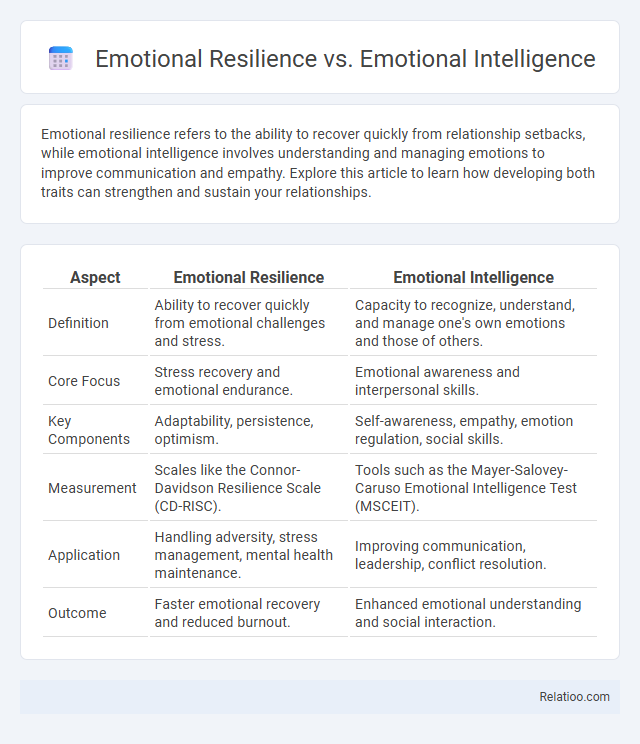Emotional resilience refers to the ability to recover quickly from relationship setbacks, while emotional intelligence involves understanding and managing emotions to improve communication and empathy. Explore this article to learn how developing both traits can strengthen and sustain your relationships.
Table of Comparison
| Aspect | Emotional Resilience | Emotional Intelligence |
|---|---|---|
| Definition | Ability to recover quickly from emotional challenges and stress. | Capacity to recognize, understand, and manage one's own emotions and those of others. |
| Core Focus | Stress recovery and emotional endurance. | Emotional awareness and interpersonal skills. |
| Key Components | Adaptability, persistence, optimism. | Self-awareness, empathy, emotion regulation, social skills. |
| Measurement | Scales like the Connor-Davidson Resilience Scale (CD-RISC). | Tools such as the Mayer-Salovey-Caruso Emotional Intelligence Test (MSCEIT). |
| Application | Handling adversity, stress management, mental health maintenance. | Improving communication, leadership, conflict resolution. |
| Outcome | Faster emotional recovery and reduced burnout. | Enhanced emotional understanding and social interaction. |
Introduction to Emotional Resilience and Emotional Intelligence
Emotional resilience refers to the ability to adapt and bounce back from stress, adversity, or trauma, enabling individuals to maintain psychological well-being in challenging situations. Emotional intelligence involves recognizing, understanding, and managing one's own emotions while effectively handling interpersonal relationships with empathy and social skills. Both emotional resilience and emotional intelligence are critical psychological constructs that enhance personal coping strategies and improve emotional regulation in daily life.
Defining Emotional Resilience
Emotional resilience is the ability to adapt to stressful situations and bounce back from adversity, trauma, or significant sources of stress. Unlike emotional intelligence, which involves recognizing, understanding, and managing your own and others' emotions, emotional resilience specifically centers on recovery and maintaining mental well-being during challenging times. Building your emotional resilience helps you maintain stability and thrive despite life's difficulties.
Understanding Emotional Intelligence
Understanding Emotional Intelligence involves recognizing your ability to perceive, manage, and express emotions effectively, which distinguishes it from emotional resilience's focus on bouncing back from adversity. Emotional intelligence encompasses skills such as empathy, self-awareness, and social skills that enhance interpersonal relationships and decision-making. Developing your emotional intelligence strengthens both personal growth and professional success by improving emotional regulation and communication.
Key Differences Between Emotional Resilience and Emotional Intelligence
Emotional resilience refers to an individual's ability to recover quickly from stress, adversity, or trauma, maintaining mental stability and well-being. Emotional intelligence encompasses the capacity to recognize, understand, and manage one's own emotions while effectively navigating interpersonal relationships and social complexities. The key difference lies in emotional resilience focusing on stress recovery and adaptability, whereas emotional intelligence emphasizes emotional awareness and regulation in both personal and social contexts.
How Emotional Intelligence Supports Resilience
Emotional intelligence enhances your emotional resilience by enabling accurate recognition and management of emotions during stress, promoting adaptive responses to challenges. High emotional intelligence supports resilience through improved empathy, self-regulation, and social skills, which foster strong relationships and effective problem-solving under pressure. Developing emotional intelligence equips you with tools to maintain mental equilibrium and bounce back more quickly from adversity.
Real-Life Examples: Resilience vs. Intelligence in Action
Emotional resilience enables you to bounce back from setbacks, as seen in individuals who recover quickly from job losses or personal failures, while emotional intelligence involves recognizing and managing your own emotions and those of others, such as navigating workplace conflicts with empathy. Real-life examples include a firefighter maintaining composure under pressure (emotional resilience) versus a manager who reads team morale to adjust communication strategies (emotional intelligence). Developing both emotional resilience and emotional intelligence enhances your capacity to handle stress and build stronger relationships in challenging environments.
Benefits of Developing Emotional Resilience
Developing emotional resilience enhances the ability to recover quickly from stress, adapt to change, and maintain mental well-being. It strengthens coping mechanisms that reduce the impact of anxiety and depression, promoting sustained productivity and healthier relationships. Emotional resilience complements emotional intelligence by providing the mental fortitude to manage emotions effectively in challenging situations.
Advantages of Enhancing Emotional Intelligence
Enhancing your Emotional Intelligence offers significant advantages, such as improved communication, better conflict resolution, and stronger interpersonal relationships. It enables you to recognize and manage your emotions effectively while empathizing with others, leading to increased social awareness and emotional regulation. Unlike Emotional Resilience, which focuses on bouncing back from adversity, Emotional Intelligence provides tools for proactive emotional management and long-term personal and professional growth.
Practical Strategies to Cultivate Both Skills
Emotional resilience involves the ability to recover quickly from stress, while emotional intelligence encompasses skills like recognizing, understanding, and managing emotions in oneself and others. Practical strategies to build emotional resilience include mindfulness practices, stress management techniques, and fostering strong social support networks, whereas enhancing emotional intelligence requires active listening, empathy training, and reflective journaling. Integrating these approaches boosts mental well-being, improves interpersonal relationships, and enhances adaptive coping mechanisms in challenging situations.
Conclusion: Integrating Resilience and Intelligence for Emotional Wellbeing
Integrating emotional resilience and emotional intelligence enhances overall emotional wellbeing by combining the ability to recover from adversity with the skill to understand and manage emotions effectively. Emotional resilience provides the strength to withstand stress, while emotional intelligence offers insight into emotional triggers and interpersonal dynamics. Together, they foster balanced emotional health, improved coping strategies, and stronger relationships.

Infographic: Emotional Resilience vs Emotional Intelligence
 relatioo.com
relatioo.com